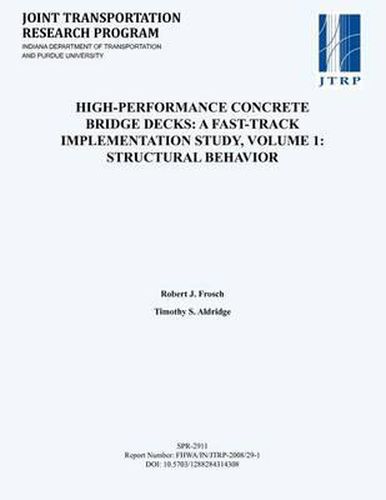Readings Newsletter
Become a Readings Member to make your shopping experience even easier.
Sign in or sign up for free!
You’re not far away from qualifying for FREE standard shipping within Australia
You’ve qualified for FREE standard shipping within Australia
The cart is loading…






Transverse cracking of concrete bridge decks is problematic in numerous states. Cracking has been identified in the negative and positive moment regions of bridges and can appear shortly after opening the structure to live loads. To improve the service life of the bridge deck as well as decrease maintenance costs, changes to current construction practices in Indiana are being considered. A typical bridge deck was instrumented which incorporated the following: increased reinforcement amounts, decreasing reinforcement spacing, and high-performance, low-shrinkage concrete. The low shrinkage concrete was achieved using a ternary concrete mix. The objective of this research was to determine the performance, particularly in terms of transverse cracking and shrinkage, of a bridge incorporating design details meant to reduce cracking. Based on measurements from the bridge, it was determined that maximum tensile strains experienced in the concrete were not sufficient to initiate cracking. An on-site inspection was performed to confirm that cracking had not initiated. The data was analyzed and compared with the behavior of a similarly constructed bridge built with nearly identical reinforcing details, but with a more conventional concrete to evaluate the effect of the HPC. Based on this study, it was observed that full-depth transverse cracks did not occur in the structure and that the use of HPC lowered the magnitude of restrained shrinkage strains and resulting tensile stresses.
$9.00 standard shipping within Australia
FREE standard shipping within Australia for orders over $100.00
Express & International shipping calculated at checkout
Transverse cracking of concrete bridge decks is problematic in numerous states. Cracking has been identified in the negative and positive moment regions of bridges and can appear shortly after opening the structure to live loads. To improve the service life of the bridge deck as well as decrease maintenance costs, changes to current construction practices in Indiana are being considered. A typical bridge deck was instrumented which incorporated the following: increased reinforcement amounts, decreasing reinforcement spacing, and high-performance, low-shrinkage concrete. The low shrinkage concrete was achieved using a ternary concrete mix. The objective of this research was to determine the performance, particularly in terms of transverse cracking and shrinkage, of a bridge incorporating design details meant to reduce cracking. Based on measurements from the bridge, it was determined that maximum tensile strains experienced in the concrete were not sufficient to initiate cracking. An on-site inspection was performed to confirm that cracking had not initiated. The data was analyzed and compared with the behavior of a similarly constructed bridge built with nearly identical reinforcing details, but with a more conventional concrete to evaluate the effect of the HPC. Based on this study, it was observed that full-depth transverse cracks did not occur in the structure and that the use of HPC lowered the magnitude of restrained shrinkage strains and resulting tensile stresses.